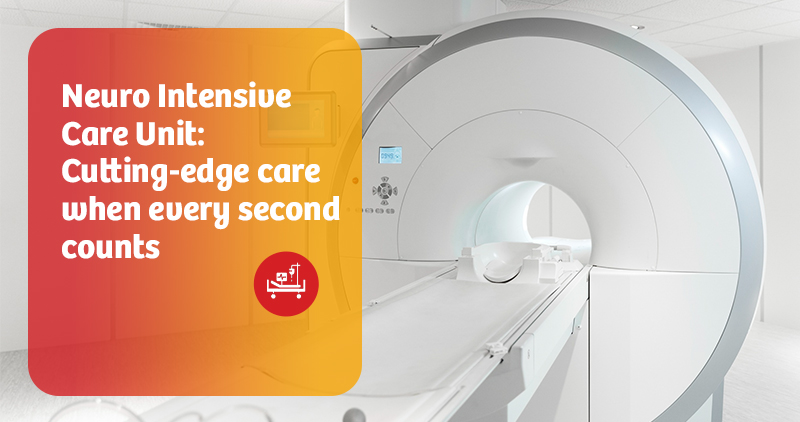The brain: Your body's data centre—But what happens when it crashes?
Think of your brain as the ultimate data centre—it receives, processes, and sends out signals to every part of your body. Now imagine what happens if this system malfunctions due to an accident, stroke, or trauma.
Just like a computer crash, everything can go haywire—mobility, speech, memory, and even consciousness.
Scary, right? Because it is a medical emergency. When the brain falters, every second counts. It demands immediate, highly specialised care—precisely what a dedicated Neuro ICU is designed for.
According to the World Health Organisation (WHO), more than 1 in 3 people worldwide are affected by neurological disorders, making them the leading cause of illness and disability. This alarming statistic highlights the urgent need for advanced neuro critical care units where clinical expertise and cutting-edge technology converge to save lives. https://www.who.int/news/item/14-03-2024-over-1-in-3-people-affected-by-neurological-conditions--the-leading-cause-of-illness-and-disability-worldwide
When it comes to treating life-threatening neurological conditions, every second matters. In such critical moments, the quality of intensive care can make the difference between recovery and long-term disability—or even life and death.
KD Hospital recognises this urgency and has developed the best Neuro Intensive Care Unit (Neuro ICU) in Ahmedabad dedicated to the comprehensive management of critically ill patients with neurological and neurosurgical conditions.
Before delving into the importance of Neuro ICU care for patients, it's essential to understand historical background.
The history of the Neuro ICU
In some ways, the first intensive care units were Neuro ICU. The need for ICU came in the 1950s because of the paralysing effect of the polio virus.
As paralysed people with polio lost their ability to breathe, they were placed on the then-new technology of mechanical ventilation.
For decades, intensive care units took care of every type of life-threatening illness, especially those that led to a need for mechanical ventilation. However, the need for more specialised care became increasingly evident as our understanding of medicine became more complex. In 1977, the first general academic Neuro ICU in North America was started at Massachusetts General Hospital. From there, they gained increasing popularity across the nation and the world.
Most Neuro ICUs are found in large academic hospitals that receive a steady stream of patients. Smaller hospitals may not have enough patients to justify the construction of a Neuro ICU. They will either care for the patient in a general ICU or transfer the patient to a different hospital.
What is a Neuro ICU?
A Neuro ICU is a highly specialised section of the hospital that provides intensive care to patients with acute brain and spinal cord injuries, stroke, epilepsy, brain tumours, neuromuscular diseases, and post-operative care following neurosurgery. These units are equipped with advanced monitoring tools and staffed by a multidisciplinary team of neurologists, neurosurgeons, critical care specialists, critical care nurses, and rehabilitation specialists.
At KD Hospital, the Neuro ICU stands as a beacon of excellence, blending state-of-the-art technology with compassionate, evidence-based care.
Why is Neuro ICU required in modern neurology?
Neurological disorders are among the leading causes of disability and death globally. Conditions like stroke, traumatic brain injury (TBI), and severe epilepsy require rapid diagnosis, continuous monitoring, and aggressive treatment strategies.
The Neuro ICU provides
- Specialised monitoring for brain activity and intracranial pressure.
- 24/7 neurological and neurosurgical consultation.
- Tailored therapies for brain swelling, seizures, and neuro-infections.
- Post-operative care for complex neurosurgical procedures.
- Backup facilities such as a cath lab and neuro emergency services are available.
The neurocritical environment is unique—patients often cannot communicate or show signs of distress due to altered consciousness.
It makes the role of specialised equipment and trained personnel indispensable.
The Neuro ICU at KD Hospital: Infrastructure & facilities
KD Hospital's Neuro ICU is designed with a focus on clinical excellence, patient safety, and holistic recovery. It houses dedicated beds with central monitoring systems that provide real-time data on vital neurological parameters.
Key features
-
1. Advanced neuro-monitoring
- Continuous video EEG (electroencephalogram) for seizure detection.
- Intracranial pressure (ICP) monitoring for trauma or hydrocephalus.
-
2. Integrated life support
- Mechanical ventilation for patients with compromised breathing.
- Advanced hemodynamic monitoring.
- Renal replacement therapy (CRRT) for patients with multi-organ involvement.
-
3. Infection controll
- Strict infection control protocols significantly reduce the risk of hospital-acquired infections, which pose a serious threat to vulnerable patients.
-
4. Imaging access
- Quick access to CT, MRI, and neuro-interventional radiology ensures prompt diagnosis and treatment planning.
-
5. Dedicated neuro-intensivist coverage
- Round-the-clock care by trained neuro intensivists ensures prompt decision-making and individualised care plans.
Conditions managed in the Neuro ICU
KD Hospital's Neuro ICU is equipped to handle a spectrum of neurological emergencies, including but not limited to:
- Stroke (ischemic and hemorrhagic)
Time is a brain in stroke management. The Neuro ICU is critical in post-thrombolysis monitoring, blood pressure control, and management of complications like cerebral oedema and seizures. - 2. Traumatic brain injury (TBI)
Patients with head trauma often need surgical intervention, followed by close neurological observation. Intracranial pressure monitoring, sedation protocols, and neuroprotective strategies are key elements of TBI care. - Post-neurosurgical recovery
After complex brain or spine surgeries, patients require continuous observation for complications such as bleeding, infections, and cerebrospinal fluid leaks. - 4. Severe epilepsy or status epilepticus
Uncontrolled seizures can lead to permanent brain damage. The Neuro ICU offers real-time EEG monitoring and titrated anticonvulsant therapy for optimal control. -
Guillain-Barré syndrome and myasthenia gravis
These neuromuscular conditions can lead to respiratory failure. Intensive ventilator support and immunotherapy are essential components of care. - Meningitis and encephalitis
Infectious conditions affecting the brain can be rapidly fatal without intensive antimicrobial therapy, ICP management, and seizure control.
Multidisciplinary approach to neurocritical care
KD Hospital's Neuro ICU thrives on collaboration. Patient care is enhanced through coordinated efforts by:
- Neurologists and neurosurgeons: For accurate diagnosis and definitive management.
- Critical care specialists: For managing hemodynamics, respiration, and systemic complications.
- Neuropsychologists and rehabilitation experts: To start early mobilisation and cognitive therapies.
- Physiotherapists and occupational therapists: For physical recovery and functional independence.
This integrated care model ensures that patients receive not just life-saving treatment but also support for a dignified recovery.
What makes KD Hospital a trusted destination for neurocritical care?
- Comprehensive expertise: Full-time neuro intensivists and super-specialists ensure focused care.
- Patient-centric philosophy: Every care decision is made with empathy and transparency in mind.
- Integrated support services: From imaging to rehab, all under one roof.
- Best-in-Class technology: Matching global standards in neurocritical monitoring.
- Track record of excellence: Consistent outcomes, patient satisfaction, and success rates.
In a nutshell
The Neuro ICU at KD Hospital stands at the intersection of innovation, expertise, and empathy with leading neurologists and neurosurgeons in Ahmedabad. It serves as a critical lifeline for patients with the most severe neurological conditions, offering not just a fighting chance at survival but also a pathway to recovery and dignity.
Whether it's a life-threatening brain injury or the delicate recovery after a complex neurosurgery, patients and families can trust KD Hospital's Neuro ICU to provide care that is not only medically excellent but also human.




